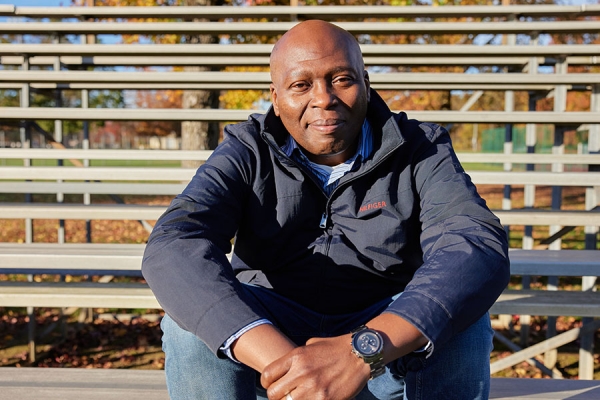Chuka U. was in his 20s when he started having heart palpitations.
“It felt like my heart was pounding and racing,” says Chuka, now 52. “You feel so uncomfortable, like you’re going to pass out.”
Concerned about his symptoms, Chuka saw a doctor, who advised him to stop drinking coffee. Meanwhile, Chuka’s heart palpitations continued to happen frequently. It would be years before a cardiologist gave him a proper diagnosis: atrial fibrillation (AFib).
A heartbeat out of sync
AFib is the most common form of arrhythmia, or abnormal heartbeat. In a healthy heart, the two top chambers of the heart, called atria, squeeze and relax. With AFib, the atria quiver quickly and irregularly. The symptoms of AFib include skipped, pounding or fluttering heartbeats; tiredness; dizziness; weakness; and shortness of breath. Having AFib increases the risk of heart failure and stroke.
Chuka’s symptoms often affected his daily life. His AFib episodes sometimes lasted hours, leaving him extremely tired.
“I would come home from work and my children would say, ‘Are you OK, daddy?’” Chuka says. “All I wanted to do was sleep.”
Chuka’s local cardiologist put him on blood thinners to help reduce his risk of stroke, a possible complication of AFib. He also thought that Chuka might benefit from seeing an AFib specialist at the Temple Heart & Vascular Institute to explore more AFib treatment options. That specialist was electrophysiologist Joshua Cooper, MD, FACC, FHRS.
Restoring the rhythm
Chuka, who lives in New Jersey, met with Dr. Cooper via telemedicine video calls for his initial appointments. Dr. Cooper reviewed Chuka’s records and test results and talked to him about his symptoms. He told Chuka that his treatment options included taking medications to control his AFib or having a procedure called cardiac ablation.
Cardiac ablation is a minimally invasive procedure. Doctors insert specialized catheters (thin, flexible wires) into blood vessels in the groin, then guide the catheters up to the heart. There, they use radio waves (radiofrequency ablation) or very cold temperature (cryoablation) to destroy with great precision the tiny areas of the heart that cause a patient’s arrhythmia.
Most AFib patients who undergo ablations at Temple have fewer symptoms. And the treatment might also help reduce the need for medications, as well as the risks of stroke and heart failure. In many cases, a single ablation procedure will successfully suppress AFib for the long term. Temple has the latest ablation techniques for AFib and other arrhythmias and is the region’s top referral center for these complex procedures.
After weighing the pros and cons of both options with Dr. Cooper, Chuka decided to move forward with ablation, hoping it would improve his symptoms and remove or reduce the need for medications.
‘Like a celebrity’
Chuka was amazed at the level of care he received from Temple.
